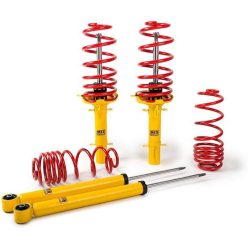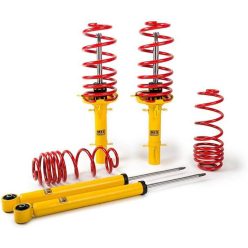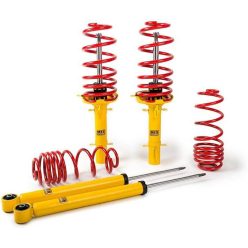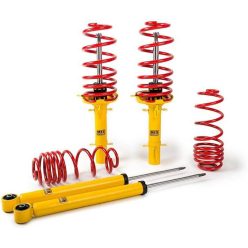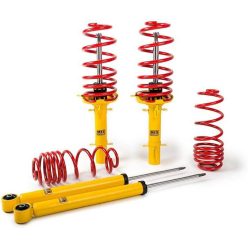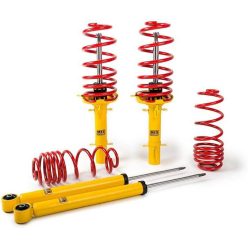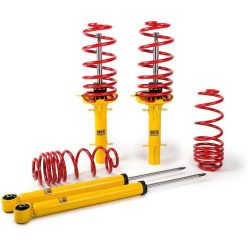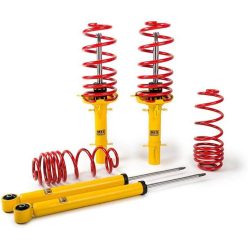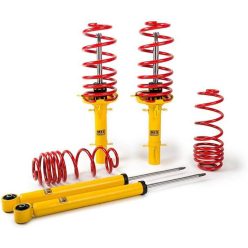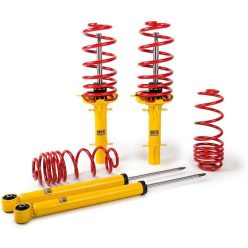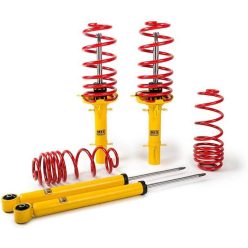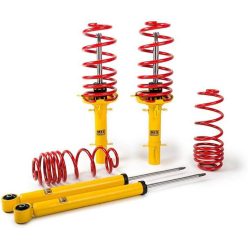The Audi – MTS Technik Suspension Kits category offers vehicle-specific sport suspension kits that combine matched lowering springs with shortened sport dampers. These MTS Technik Suspension Lowering Kit sets are available for classic Audi models such as 50 and 80/90, with typical drops in the 30–60 mm range depending on the application. The carefully tuned spring–damper pairing reduces arch gap and body roll while still keeping the car usable and predictable for everyday road driving.
Net price: 370 €
Net price: 362 €
Net price: 360 €
Net price: 362 €
Net price: 370 €
Net price: 365 €
Net price: 410 €
Net price: 415 €
Net price: 365 €
Net price: 360 €
Sharper stance and handling for Audi with MTS Technik kits
Audi – MTS Technik Suspension Kits bring a complete sport upgrade to the factory chassis by replacing stock components with matched spring–damper packages. These sport suspension kits use shortened shock absorbers and lowering springs designed to work together, so lowering the car is not just cosmetic but also a handling improvement. The result is that classic Audi models such as the 50 and 80/90 lose their “4x4” wheel gap, gain better body control in bends and under braking, and keep a ride quality that remains acceptable for daily use.
MTS Technik sport suspension assemblies typically deliver drops in the 30–60 mm range, with each kit specifying the exact amount of lowering per axle (for example 40/40 mm or 60/40 mm). This reduction in ride height lowers the centre of gravity, decreases body roll and dive, and improves the way the car responds to steering inputs. A 2-year warranty with no mileage limit and TÜV certificates for many applications underline that these are engineered solutions rather than generic “cut spring” style modifications, giving confidence for long-term use on the road.
Technical Basics
An MTS Technik Suspension Lowering Kit is a full sport suspension, not just a set of springs. It combines lowering springs with appropriately selected sport shock absorbers, so damping is matched to the reduced travel and higher rates. The springs are made from high-quality chromium–silicon steel, cold-wound and then chemically protected against corrosion, helping them retain their performance and appearance over time. The shortened sport dampers are tuned for this combination, giving a firm but controlled feel rather than a bouncy, underdamped ride.
A key advantage is that springs and dampers are engineered as a system, so the damping curves follow the chosen spring rates. This allows the suspension to reduce body movement markedly while still keeping an acceptable level of comfort for street use. MTS documentation emphasises that the aim is a compromise between stiffness and comfort, not an ultra-harsh, track-only setup. Most kits also include TÜV approval and clearly defined axle-load limits, which are essential for legal use and roadworthiness inspections in many countries.
For specific Audi platforms – such as the 80 B2/B3 saloon and Coupé – the manufacturer lists precise lowering values for given engine ranges and years, for example 40 mm or 60 mm drops on one or both axles. These values are closely tied to maximum permitted front and rear axle loads, so the kit performs as intended only when the car’s weight and axle loads fall within the specified window. This is why separate part numbers exist for lighter, small-engine variants and heavier versions with larger engines, even within the same Audi model family.
Selection Criteria
Choosing an Audi – MTS Technik Suspension Kit begins with accurately identifying the vehicle: exact model (for example Audi 80 B2/B3), body style, production year, engine and drivetrain. Each kit is engineered for specific chassis codes and axle-load ranges; using the wrong application can result in incorrect ride height, poor damping and potentially compromised safety. Always cross-check part numbers against the official application charts and the information provided on the product pages rather than guessing based on appearance.
The next step is clarifying your intended use case. For mostly road-driven cars with occasional spirited driving, a 30–40 mm drop is often ideal: it cleans up the wheel arch gap, firms the chassis and improves steering response while preserving enough travel for comfort and safety. More aggressive 50–60 mm drops can further enhance stance and cornering, but they also increase the risk of contact with speed bumps, ramps and rough surfaces. MTS guidance notes that drops up to around 40 mm can sometimes work with OE dampers, but for more substantial lowering a complete sport suspension kit is strongly recommended.
Wheel and tyre choices must also be considered. A 30–40 mm drop on a classic Audi 80 generally works well with stock or moderately upsized wheels, but wide tyres, low offsets or spacers can bring the sidewall close to the arch liner or fender lip. It is important to test with realistic loads—passengers and luggage—to ensure there is no rubbing at full lock or over larger bumps. For a road car, leaving a little extra clearance is often better than running at the absolute lowest ride height and fighting every driveway or speed bump you encounter.
Installation & Maintenance
Installing MTS Technik sport suspension kits is a safety-critical job and should ideally be handled by an experienced workshop. Replacing springs and dampers requires proper spring compressors, secure support for suspension arms and torqueing all fasteners to factory specifications. During installation it is wise to inspect top mounts, bearings, dust boots and bump stops, replacing worn parts so the new suspension works in a refreshed environment rather than alongside tired original components.
After installation, a full four-wheel alignment (toe, camber and caster where applicable) is mandatory, because lowering changes baseline geometry. With larger drops (50–60 mm), camber and toe can move significantly, leading to unstable handling and rapid tyre wear if not corrected. During the initial running-in period of a few hundred kilometres, it is sensible to avoid extreme abuse; once springs and bushings have settled, re-check all mounting bolts and, if needed, fine-tune ride height and alignment.
Over the long term, maintenance mainly involves regular visual checks and periodic inspection by a suspension specialist. Look for signs of damper oil leakage, chipped or damaged spring paint, cracked dust boots and wear in ball joints or bushings. Firmer suspension and more enthusiastic driving place extra demands on the entire chassis, so routine checks help keep the Audi safe and enjoyable to drive. It is worth remembering that a poorly chosen or badly installed sport suspension kit can actually worsen handling and braking distances, so correct application and professional setup are just as important as the hardware itself.
FAQ
How much will an MTS Technik kit lower my Audi?
Most Suspension Lowering Kit applications for Audi provide drops in the 30–60 mm range, with exact front and rear values specified per part number. Always refer to the individual product page to confirm the lowering figures for your exact model and engine.
Is an MTS Technik sport suspension comfortable enough for daily driving?
Yes. MTS Technik suspension kits are designed to be firmer and more controlled than stock, not brutally harsh. You will feel more of the road surface, but in return you gain better body control, sharper steering and increased confidence, which many drivers prefer for everyday use.
Do I need a full kit, or are lowering springs alone sufficient?
For mild drops, springs alone can sometimes work, but MTS recommends a complete spring–damper kit for more substantial lowering. Shortened sport dampers are tuned for the reduced travel, improving control, durability and overall ride quality compared with lowering springs on tired OE shocks.
Is a wheel alignment required after fitting an MTS kit?
Absolutely. Lowering alters suspension geometry, so a full four-wheel alignment is essential after installation. Without it, the car may feel unstable and tyres can wear very quickly on the inner or outer edges.
How often should an MTS Technik suspension kit be inspected?
It is sensible to have the complete suspension system checked at least annually, or more frequently if the car sees hard driving or track use. Watch for unusual noises, changes in ride quality or visible leaks, and have any issues investigated promptly.
Will an MTS Technik sport suspension affect roadworthiness tests?
If you choose the correct, TÜV-approved kit for your Audi and it is installed professionally within the stated lowering and axle-load limits, it should generally pass inspections without issues. Regulations vary by country, so always verify local requirements in advance.

